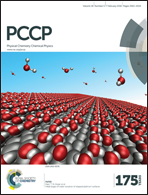Designing voltage multipliers with nanofluidic diodes immersed in aqueous salt solutions
Abstract
Membranes with nanofluidic diodes allow the selective control of molecules in physiological salt solutions at ambient temperature. The electrical coupling of the membranes with conventional electronic elements such as capacitors suggests opportunities for the external monitoring of sensors and actuators. We demonstrate experimentally and theoretically the voltage multiplier functionality of simple electrical networks composed of membranes with conical nanopores coupled to load capacitors. The robust operation of half and full wave voltage multipliers is achieved in a broad range of experimental conditions (single pore and multipore membranes, electrolyte concentrations, voltage amplitudes, and solid-state capacitances). The designed voltage multipliers operate in the liquid state and can be used in sensing devices because different electrical, optical, and chemical inputs are known to modulate the individual nanofluidic diode resistances in the electrical network.


 Please wait while we load your content...
Please wait while we load your content...